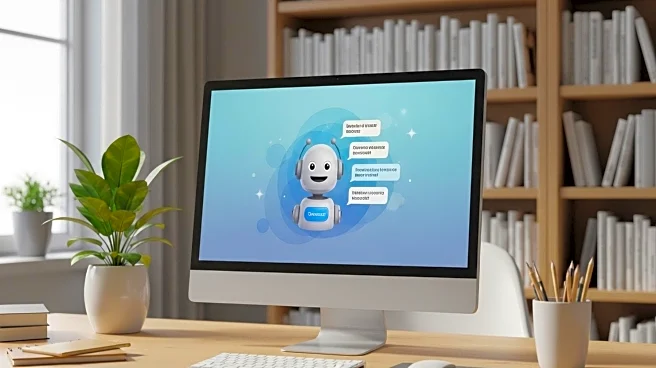What's Happening?
As access to traditional therapy becomes increasingly difficult due to high costs and a shortage of licensed therapists, many individuals are turning to AI chatbots for mental health support. These AI tools, such as ChatGPT developed by OpenAI, are marketed as 'mental health companions' and are being used by people who are priced out of therapy or have had negative experiences with human therapists. Kristen Johansson, a 32-year-old mother, is one such individual who has found solace in using ChatGPT after her therapy sessions became unaffordable. The AI provides her with a non-judgmental, always-available presence that she finds comforting. However, the use of AI in mental health raises significant questions about the ethical implications and the potential risks involved, especially when these tools attempt to simulate deep therapeutic relationships.
Why It's Important?
The increasing reliance on AI chatbots for mental health support highlights a critical gap in the availability and affordability of traditional therapy services in the U.S. This trend could have significant implications for the mental health industry, potentially reshaping how support is provided and accessed. While AI can offer immediate and accessible support, experts like Dr. Jodi Halpern caution against the risks of developing emotional dependencies on these tools, which lack the ethical oversight of human therapists. The situation underscores the need for regulatory frameworks to ensure that AI tools are used safely and effectively, particularly for vulnerable populations such as children and individuals with severe mental health issues.
What's Next?
As AI chatbots continue to gain popularity, there is a pressing need for regulatory measures to ensure their safe use in mental health contexts. Companies like OpenAI are beginning to implement safety guardrails, especially for younger users, but more comprehensive regulations are necessary. The mental health industry may need to adapt by integrating AI tools with traditional therapy practices, ensuring that human therapists are aware of and can guide the use of these technologies. Ongoing discussions and legislative efforts will likely focus on establishing ethical guidelines and safety standards for AI in mental health.
Beyond the Headlines
The integration of AI into mental health care could lead to broader cultural shifts in how society perceives and addresses mental health issues. As AI tools become more prevalent, there may be changes in the stigma associated with seeking mental health support, potentially making it more accessible and acceptable. However, the ethical considerations surrounding AI's role in simulating empathy and emotional support will continue to be a topic of debate, highlighting the need for ongoing dialogue between technologists, mental health professionals, and policymakers.










